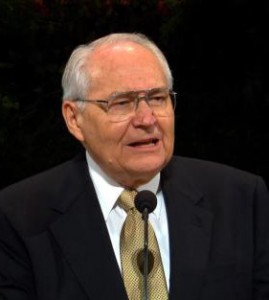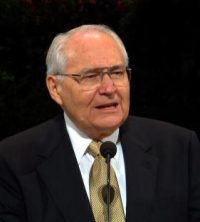Lest we think that only the Brethren during Brigham’s era were interested in building Zion, here’s a great quote by Apostle L. Tom Perry in the April 2001 General Conference which brings out an element of building Zion that we often over-look – the economic side of Zion:
“The Prophet had a design to build a community of Saints. He had three major objectives: first, economic; second, educational; and third, spiritual.
“The Prophet Joseph Smith’s desire was that the Saints should become economically self-sufficient…. A treasured remnant of our heritage of economic self-sufficiency is the Church Welfare Services program.”
Although Brother Perry only uses the term “Zion” twice later in his talk, it’s not a difficult leap to realize that the “community of Saints” Joseph Smith “had a design to build” was just that – Zion.
 The above quote shows that, like the prophets and apostles of the Utah Territory years, Elder Perry saw that building Zion has a strong economic element. He said that Joseph’s goal in this regard was that the Saints achieve economic self-sufficiency.
The above quote shows that, like the prophets and apostles of the Utah Territory years, Elder Perry saw that building Zion has a strong economic element. He said that Joseph’s goal in this regard was that the Saints achieve economic self-sufficiency.
The Saints during Utah’s early years took Joseph’s goal to heart and sought to achieve economic self-sufficiency by producing everything they needed if they possibly could. Both Brigham Young and John Taylor persuaded the successful businessmen of their times to consecrate of their abundance to establish cooperatives to not only provide jobs for other Saints but also to produce the products the they needed to achieve economic self-sufficiency as a people.
Here’s a quote from John Taylor in 1858 which expresses their desire to achieve Joseph’s goal:
“Can any of you tell me how you are going to get your next year’s clothing? No man can be independent who is dependent upon others; no nation can be independent that is dependent upon another nation for its sustenance…. but we cannot be independent until we can make our own shoes, dresses, shawls, bonnets, pantaloons, hats, and all such things as we need. When we can do these things, raise our own food, manufacture everything we need among ourselves, then we shall be independent of other people.”
This is why the plan I am currently proposing, for beginning a process that will eventually result in a Zion community, includes a strong economic element. The goal is still to eventually achieve economic self-sufficiency. This has at least two benefits. One is that a self-sufficient community (like Brigham City in the 1860s) is mostly immune to the roller-coaster business cycles that Babylon’s economy experiences. The nation’s worst year during the 1860s was Brigham City’s best.
Another benefit of a community achieving economic self-sufficiency is that the freedom of the citizens is more secure. Elder Erastus Snow said in 1877, “if we are dependent upon other people then are we their servants and they our masters.”
